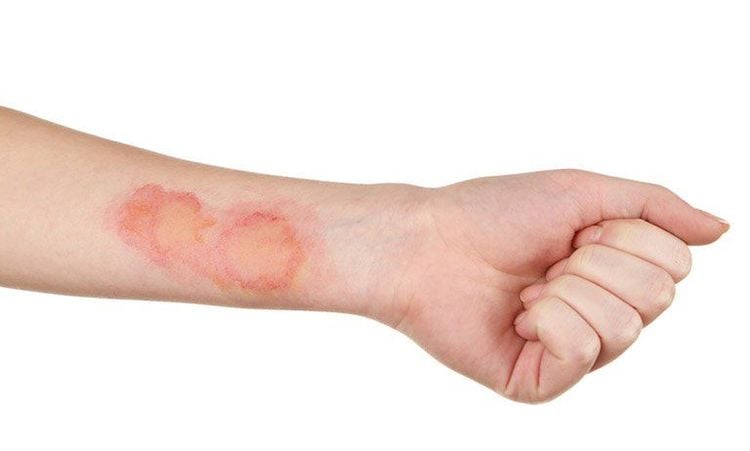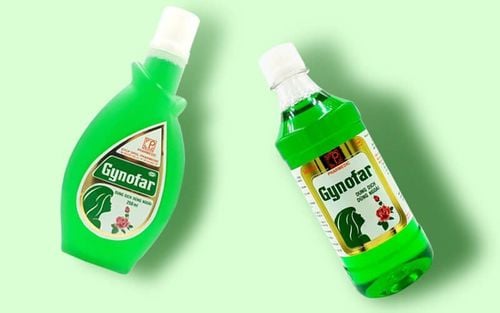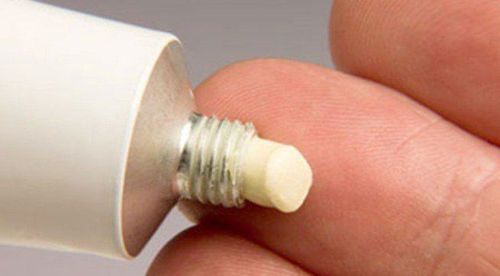This is an automatically translated article.
Lotrizole includes the antifungal clotrimazole and the steroid anti-inflammatory drug betamethasone. Lotrisone is used topically, applied topically in the treatment of fungal skin diseases in adults.
1. What does Lotrisone do?
Lotrisone is used to treat many types of fungal skin infections such as ringworm and tinea pedis. Lotrisone contains 2 ingredients. Clotrimazole is an azole antifungal drug that works by stopping the growth of fungi. Betamethasone is a potent corticosteroid that works by reducing the swelling, redness, and itching that occurs with skin infections. This medicine is not recommended for children under 17 years of age or with diaper rash.

Thuốc Lotrisone được sử dụng để điều trị nhiều loại nhiễm trùng da
2. How to use the drug Lotrisone
Always remember to read the instructions for use for the patient before each use of the medicine. If you have any questions, consult your doctor or pharmacist.
If you are using the lotion form of Lotrisone, shake the bottle well before each use. Use this medicine externally only. Clean and dry the area to be treated completely. Apply a thin layer of the medication to the affected area and gently rub it in. It is usually taken twice daily (in the morning and in the evening) or as directed by your doctor. Wash your hands after use unless you are using the medication to treat the skin on your hands.
Do not wrap, cover, or bandage the treated area unless directed to do so by your doctor. Wear loose-fitting clothes after applying the medication to the groin area. Do not put the medicine in your eyes, nose, mouth, or inside the vagina. If you get medication in these areas, rinse with plenty of water.
Dosage and duration of treatment are not the same for each patient, depending on the type of skin infection being treated. Ringworm or itchy skin is usually treated for 2 weeks while tinea pedis is usually treated for 4 weeks.
Do not use more than 45 grams of cream or 45 ml of lotion per week unless directed and closely supervised by a doctor. Not applicable for more frequent use or longer than indicated use. This may increase the risk of side effects.
To help you remember, use it at the same times each day. Continue using this medicine until the prescribed medication is gone, even if symptoms have disappeared after the first few days. Stopping the medication too soon can cause the infection to return. Inform your doctor if your skin condition worsens or does not improve after 1 week of treatment for itchy skin or ringworm; 2 weeks after foot fungus treatment.
3. Side effects
Patients may experience burning, tingling, dry skin or stinging. If any of these effects persist or get worse, tell your doctor or pharmacist right away. Remember that your doctor has prescribed this medicine because they have judged that the benefit to you is greater than the risk of side effects. Many people who use Lotrisone do not experience serious side effects.
Tell your doctor right away if any of these unlikely but serious side effects occur, including: Excessive hair growth, thinning skin, darkening, acne, stretch marks, "u hair" (folliculitis). Rarely, Lotrisone may be absorbed from the skin into the bloodstream. This can lead to the side effects of too much corticosteroids. These side effects are more likely to occur in children and in people who use Lotrisone for a long time or over large areas of skin. Tell your doctor right away if any of the following side effects occur: Extreme fatigue, weight loss, headache, swollen ankles, swollen feet, increased thirst, increased urination, problems vision issue.
A very serious allergic reaction to Lotrisone is very rare. However, seek immediate medical attention if you notice any of the following symptoms of a serious allergic reaction, including: Rash, itching, facial swelling, swelling of the throat, dizziness severe face, difficulty breathing. This is not a complete list of possible side effects. If you notice other effects not listed above, contact your doctor or pharmacist.

Hãy cho bác sĩ biết nếu bạn gặp tác dụng phụ không mong muốn như mụn trứng cá
4. Notes when using the drug Lotrisone
Before using this medication, tell your doctor or pharmacist if you have a history of allergy to clotrimazole or betamethasone; or with other azole antifungals (eg, ketoconazole) or corticosteroids (eg, triamcinolone); or even if you have any other allergies.
Lotrisone may contain inactive ingredients, called excipients, that can cause allergic reactions or other problems. Talk to your pharmacist for more details.
Before using this medication, tell your doctor or pharmacist your previous medical history, especially of: Immune system problems, poor blood circulation. Use caution when using this medicine in the elderly because they are at higher risk of side effects, especially thinning of the skin.
Using corticosteroids for long periods of time or over large areas of skin is not associated with a harder time for your body to respond to physical stress. Therefore, before surgery or emergency treatment, or if you have a serious illness or injury, tell your doctor or dentist that you are taking Lotrisone or have used Lotrisone within the past few months. .
Although unlikely, this medicine may temporarily slow a child's growth if used for a long time. See your doctor regularly to check and monitor your child's physical development.
During pregnancy, Lotrisone should be used only when clearly needed. Discuss the risks and benefits with your doctor. There is currently no firm evidence whether Lotrisone passes into breast milk while similar drugs are found in breast milk. Consult your doctor before breastfeeding.
5. Drug interactions
Reactions to other medicines can change the way the medicine works or increase the risk of serious side effects. This document does not cover all possible drug interactions.
Keep a list of all the products you use (such as prescription drugs, over-the-counter medicines and herbal products) and tell your doctor and pharmacist. Do not start, stop, or change the dose of any medicine without your doctor's approval.
Some products that may interact with Lotrisone are: Other corticosteroid products (such as prednisone). Overdose This medicine may be harmful if swallowed. If someone has overdosed and has severe symptoms such as fainting or difficulty breathing, call 911 or go to the nearest medical facility.
Do not share this medicine with other medicines. Laboratory tests such as adrenal function tests may be performed periodically to monitor disease progression or check for side effects, especially if you have been using this medicine for a long time. prolonged or applied over large areas of skin of the body. Consult your doctor. Do not use it later for another infection unless your doctor tells you to.
Please dial HOTLINE for more information or register for an appointment HERE. Download MyVinmec app to make appointments faster and to manage your bookings easily.
Reference source: webmd.com













